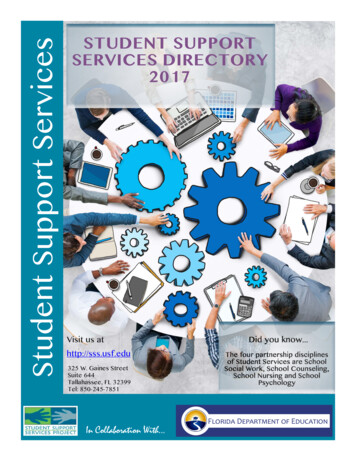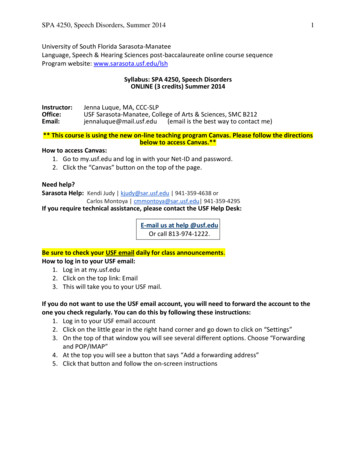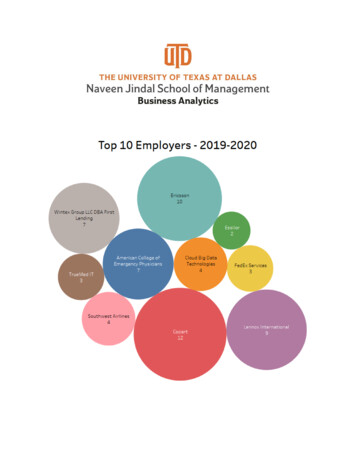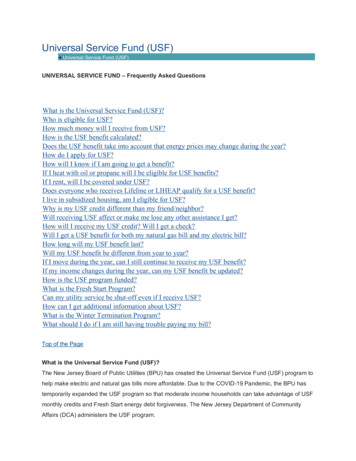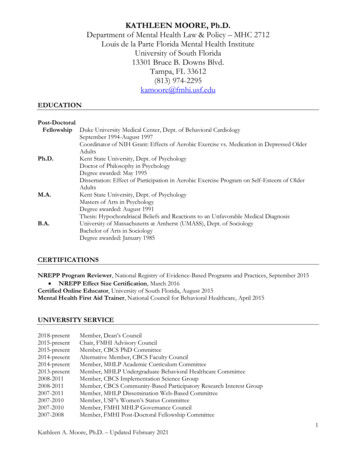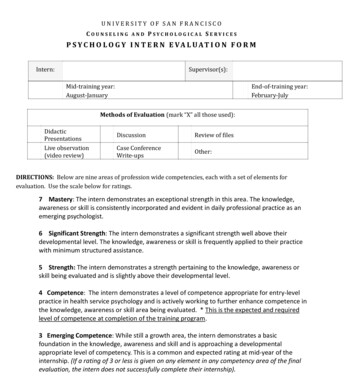
Transcription
UNIVERSITY OF SAN FRANCISCOC O UN SE LIN G AN D PSYCHO LO GICA L SE RVICE SP S Y C H O L O G Y I N T E R N E VA L U AT I O N F O R MIntern:Supervisor(s):Mid-training year:August-JanuaryDidacticPresentationsLive observation(video review)Methods of Evaluation (mark “X” all those used):DiscussionCase ConferenceWrite-upsEnd-of-training year:February-JulyReview of filesOther:DIRECTIONS: Below are nine areas of profession wide competencies, each with a set of elements forevaluation. Use the scale below for ratings.7 Mastery: The intern demonstrates an exceptional strength in this area. The knowledge,awareness or skill is consistently incorporated and evident in daily professional practice as anemerging psychologist.6 Significant Strength: The intern demonstrates a significant strength well above theirdevelopmental level. The knowledge, awareness or skill is frequently applied to their practicewith minimum structured assistance.5 Strength: The intern demonstrates a strength pertaining to the knowledge, awareness orskill being evaluated and is slightly above their developmental level.4 Competence: The intern demonstrates a level of competence appropriate for entry-levelpractice in health service psychology and is actively working to further enhance competence inthe knowledge, awareness or skill area being evaluated. * This is the expected and requiredlevel of competence at completion of the training program.3 Emerging Competence: While still a growth area, the intern demonstrates a basicfoundation in the knowledge, awareness and skill and is approaching a developmentalappropriate level of competency. This is a common and expected rating at mid-year of theinternship. (If a rating of 3 or less is given on any element in any competency area of the finalevaluation, the intern does not successfully complete their internship).
2 Significant Growth Area: The knowledge, awareness or skill should be a major focus for theintern. Specialized attention should be provided in supervision and remedial work may berequired for the intern to achieve competence.1 Remedial: Intern lacks understanding and demonstrates minimal evidence of theknowledge, awareness or skill. A specific remediation plan should be implemented withincreased supervision and careful monitoring to help intern achieve competence.NA-Not applicableU-Unable to Evaluate (Supervisor has not been able to assess this competency)Aim #1: Develop core clinical and counseling skills for entry level practice in health servicepsychology.Aim #2: Foster attitudes and behaviors which promote a professional identity as a psychologist.Observed level:COMPETENCY I: RESEARCHMid-yearEnd ofYear1A. Critically evaluates and disseminates research or other scholarly activities (e.g., caseconference presentations, in-service presentations, publications) at the local, regional, ornational level.1B. Participates in seminars that involve reading, discussion, and application of researchfindings to clinical work.1C. Develops a program and/or implements a program evaluation informed by scholarlyresearch and relevant to a University setting.Comments for the 1st Evaluation:Type text hereComments for the 2nd Evaluation:Type text hereObserved level:
C O M P E T E N C Y I I : E T H I C A L A N D L E G A L S TA N D A R D SMid-yearEnd ofYear2A. Demonstrates knowledge of and acts in accordance with APA Ethical Principles ofPsychologists and Code of Conduct.2B2C2B. Demonstrates knowledge of relevant CA laws and regulations, and relevantprofessional standards, guidelines, rules and policies governing health service psychology.2C. Recognizes ethical dilemmas and applies ethical decision-making processes.2D 2D. Conducts self in an ethical manner in all professional activities.2E. Seeks guidance and consultation from supervisors in addressing ethical and legalissues.Comments for the 1st Evaluation:Type text hereComments for the 2nd Evaluation:Type text hereC O M P E T E N C Y I I I : I N D I V I D U A L A N D C U LT U R A LDIVERSITY3A. Demonstrates an understanding of how own personal and cultural history mayimpact interactions with those who are different from themselves.3B. Demonstrates knowledge of current theoretical and empirical knowledge bases as itrelates to diversity in all professional activities.3C. Integrates awareness and knowledge of individual and cultural differences in theconduct of professional roles.3D. Integrates knowledge and understanding of diversity and culture into assessment,case formulation, treatment planning, and interventions.3E. Independently applies knowledge in working effectively with a range of diverseindividuals and groups.3F. Pursues on-going learning about individual and cultural diversity.Observed level:Mid-yearEnd ofyear
Comments for the 1st Evaluation:Type text hereComments for the 2nd Evaluation:Type text hereC O M P E T E N C Y I V : P R O F E S S I O N A L VA L U E S , AT T I T U D E S ,A N D B E H AV I O R S4A. Conducts self in ways that reflect the values and attitudes of psychology, includingintegrity, deportment, professional identity, professional development,accountability, and concern for the welfare of others.4B. Demonstrates the ability to engage in reflective practice.4C. Demonstrate openness and responsiveness to feedback and supervision.4D. Responds professionally in increasingly complex situations with a greater degree ofindependence.4E. Regularly attends and actively participates in trainings as an engaged participant;comes prepared to discuss case material and/or readings.4F. Demonstrates understanding and adherence to CAPS clinical and administrativepolicies and procedures.4G. Recognizes areas of strength and areas of growth in all professional roles.4H. Self-monitors own reactions, behaviors, and needs for self-care and takes initiative inaddressing concerns.4I. Demonstrates competence in time management skills including punctuality, meetingproject deadlines, and CAPS commitments.4J. Effectively manages clinical demands of the expected client caseload.Comments for the 1st Evaluation:Type text hereComments for the 2nd Evaluation:Type text hereObserved level:Mid-yearEnd ofyear
C O M P E T E N C Y V : C O M M U N I C AT I O N A N DINTERPERSONAL SKILLSObserved level:Mid-yearEnd ofYear5A. Develops and maintains good working relationships with a range of individualsincluding the training cohort, professional and administrative staff, the University andthe wider community.5B. Effectively produces and comprehends oral, nonverbal, and writtencommunications, displaying a thorough grasp of professional language.5C. Demonstrates effective interpersonal skills and the ability to manage challenginginteractions.5D. Maintains appropriate and timely recordkeeping in accordance with professionalstandards and CAPS policies.5E. Collaborates and provides constructive feedback to supervisor(s), training staff,and training cohort.Comments for the 1st Evaluation:Type text hereComments for the 2nd Evaluation:Type text hereObserved level:COMPETENCY VI: ASSESSMENT6A. Selects and applies assessment methods that draw from empirical literature.6B. Gathers accurate and relevant data during an intake assessment, utilizing multiplesources and methods.6C. Demonstrates current knowledge of diagnostic classification systems, functional anddysfunctional behaviors, including client strengths and psychopathology.6D. Demonstrates understanding of human behavior within its context (e.g., family,social, societal and cultural).6E. Applies knowledge of functional and dysfunctional behaviors including context to theassessment and/or diagnostic process.Mid-yearEnd ofyear
6F. Interprets assessment results to inform case conceptualization, diagnosticimpressions (that are culturally contextualized and developmentally appropriate),and disposition planning.6G. Articulates appropriate brief therapy case formulations.6H. Communicates findings in an accurate and effective manner to clients, supervisors,and appropriate 3rd parties.Comments for the 1st Evaluation:Type text hereComments for the 2nd Evaluation:Type text hereObserved level:C O M P E T E N C Y V I I : I N T E RV E N T I O N7A. Establishes and maintains effective working relationships with clients reporting arange of presenting problems and developmental concerns.7B. Develops evidence-based intervention plans in accordance with service deliverymodel and therapeutic goals of client.7C. Applies relevant research literature to clinical decision making.7D. Implements interventions informed by current scientific literature, diversitycharacteristics, and contextual variables.7E. Integrates a range of evidence-based therapeutic modalities and interventions asappropriate for clients and in accordance with service delivery model.7F. Modifies and adapts evidence-based approaches.7G. Evaluates intervention effectiveness, and modifies intervention goals as necessary incollaboration with the client.7H. Refers clients to appropriate university resources and/or community referrals,including psychiatric evaluation, longer-term therapy, and intensive outpatienttherapy.Comments for the 1st Evaluation:N/AComments for the 2nd Evaluation:Mid-yearEnd ofyear
Observed level:C O M P E T E N C Y V I I I : S U P E RV I S I O NMid-year8A. Demonstrates knowledge of supervision models and practices.8B. Applies supervisory models and practice in peer supervision with psychology interns.Averaged Overall Level :End ofYearN/AN/AComments for the 1st Evaluation:Type text hereComments for the 2nd Evaluation:Type text hereC O M P E T E N C Y I X : C O N S U LTAT I O N A N DI N T E R P RO F E S S I O N A L / I N T E R D I S C I P L I N A RY S K I L L S9A. Consults in a respectful and competent manner with faculty, administrators, studentsupport staff, and other university professionals.9B. Consults in a respectful and competent manner and with mental health professionals,family members, and agencies outside of the university.9C. Responds sensitively and appropriately to ethical issues, confidentiality, andprofessional boundaries during consultation.9D. Provides accurate and relevant information, appropriate referrals, and effectivefollow-up, as necessary.Comments for the 1st Evaluation:Type text hereComments for the 2nd Evaluation:Type text hereObserved level:Mid-yearEnd ofYear
X . P R O G R A M S P E C I F I C C O M P E T E N C Y: C R I S I S R E S P O N S EObserved level:Mid-yearEnd ofYear10A. Identifies urgent/emergency situations and conducts risk assessments pertaining todanger to self/others and grave disability.10B. Implements appropriate crisis interventions.10C. Appropriately seeks consultation in crisis response.10D. Determines and facilitates appropriate dispositions related to urgency, andconducts appropriate follow-up with client and/or provider.10E. Utilizes family, social, academic, medical, or other environmental support systems toassist students in crisis.10F. Manages internal responses and maintains sound judgment during crisis situations.10G. Completes appropriate documentation of crisis assessment and response, includingsafety and risk factors, in a timely manner according to CAPS policies andprofessional standards.Comments for the 1st Evaluation:Type text hereComments for the 2nd Evaluation:Type text hereX I . P R O G R A M S P E C I F I C C O M P E T E N C Y: O U T R E A C HObserved level:Mid-year11A. Designs effective outreach programming based on demonstrated need in theUniversity community.11B. Integrates knowledge and understanding of diversity and culture into outreachprogramming.11C. Provides accurate and relevant information in outreach activities.11D. Effectively represents CAPS and the range of services provided to the Universitycommunity.End ofYear
11E. Utilizes evaluation measures to improve outreach activities.Comments for the 1st Evaluation:Type text hereComments for the 2nd Evaluation:Type text hereAdditional Feedback:Comments for the 1st Evaluation:Type text hereComments for the 2nd Evaluation:Type text hereTraining Recommendations:Comments for the 1st Evaluation:Type text hereComments for the 2nd Evaluation:Type text hereMid-Training Year EvaluationEnd-of-Training Year EvaluationPrimary Supervisor’s SignatureDatePrimary Supervisor’s SignatureDateDelegated Supervisor’s SignatureDateDelegated Supervisor’s SignatureDateIntern’s Signature*DateIntern’s Signature*Date
Training Director’s SignatureDateTraining Director’s Signature*Intern’s signature indicates they have reviewed the evaluation with their primary supervisorDate
Counseling & Psychological ServicesDoctoral Internship in Health Service PsychologyDue Process and Grievance ProceduresI. DUE PROCESSThis document provides Counseling & Psychological Services (CAPS) Psychology internsand staff with an overview of the identification and management of interns’ problems andconcerns and an explicit discussion of the related due process procedures. The basic meaning ofdue process is to inform and to provide a framework to respond, act, or dispute. Due processensures that decisions about interns are not arbitrary or personally based. It requires that thetraining program identify specific procedures, which are applied to all intern complaints,concerns, and appeals.A. Overview of Due Process Guidelines1. During the orientation period, interns will receive, in writing, CAPS’ expectations related toprofessional functioning. The Training Director will discuss these expectations in both group andindividual settings.2. The procedures for evaluation, including when and how formal evaluations will be conductedwill be described. Formal evaluations will occur at mid-year and end-of-year. Additionally,informal feedback will be given throughout the training year.3. The various procedures and actions regarding problem behaviors or intern concerns will bedescribed.4. CAPS will communicate early and often with the intern and the intern’s Academic TrainingDirector, when needed, if any difficulties are identified that are significantly interfering withperformance.5. The Training Director will institute, when appropriate, a remediation plan for identifiedinadequacies, including a time frame for expected remediation and consequences of notrectifying the inadequacies.6. If an intern wants to institute an appeals process, this document describes the steps of how anintern may officially appeal the action (see section D below, Due Process Procedures: AppealsProcess).
7. CAPS Due Process Procedures ensure that interns have sufficient time (as described in this dueprocess document) to respond to any action taken by the program before the action isimplemented.8. When evaluating or making decisions about an intern’s performance, CAPS will use input fromlicensed staff involved in supervising the intern.9. The Training Director will document, in writing, and provide to all relevant parties, the actionstaken by the program and the rationale for all actions.10. All interns are expected to abide by the APA Code of Ethics, California laws and regulationsas well as University rules and procedures. Either administrative leave or termination would beinvoked in cases of severe violations of the APA Code of Ethics, or when imminent physical orpsychological harm to a client, staff member, or other trainee is a major factor, or the intern isunable to complete the training program due to physical, mental, or emotional illness. Internsare required to abide by University rules and procedures as outlined in the University’s HumanResources Policies: roceduresB. Due Process Procedures: Identifying Problematic BehaviorProblematic Behavior is defined broadly as an interference in professional functioning, which isreflected in one or more of the following ways: An inability and/or unwillingness to acquire and integrate professional standards into one'srepertoire of professional behavior;An inability to acquire professional skills in order to reach an acceptable level of competencyand/orAn inability to manage personal stress, strong emotional reactions, and/or the presence ofpsychological dysfunction, which interferes with professional functioning.It is a professional judgment when an intern's behavior is considered problematic rather than “ofconcern.” Interns may exhibit behaviors, attitudes, or characteristics that, while of concern andrequiring remediation, are not unexpected or excessive for training professionals. Problematicbehavior is typically identified when one or more of the following characteristics exist: The intern does not acknowledge, understand, or address the problem when it is identified;The problem is not merely a reflection of a skill deficit that can be rectified by academic ordidactic training;The quality of services delivered by the intern is significantly negatively affected;
The problem is not restricted to one area of professional functioning;A disproportionate amount of attention by training personnel is required; and/orThe intern's behavior does not change as a function of feedback, remediation efforts, and/ortime.C. Due Process Procedures: Addressing & Managing Problematic Behavior1. Initial ProceduresMinimum level of competency issues:Interns are formally evaluated on a Likert scale from one to seven for each element on theCAPS Psychology Intern Evaluation Form. It is expected that an Intern will receive a ratingof 3 (Emerging Competence) on all elements in all Competency areas at mid-year. If anIntern receives a rating of two at mid-year on any element, the primary supervisorprovides specialized attention to increase the Intern’s functioning to the expected level ofcompetency which may include remedial work. If an Intern receives a rating of one on anyelement at mid-year, the Primary Supervisor, in collaboration with the Training Director,develops and institutes a specific remediation plan. At this time, the Training Director willprovide the Academic Training Director with the written remediation plan andsubsequently will provide follow-up documentation about the intern’s progress inmeeting the requirements of the plan.For successful completion of the internship, it is expected that the Intern will receive arating of 4 (Competence Level) at end of year on all elements in all Profession Wide andProgram Specific Competency areas. If a rating of 1-“Remedial”, 2-“Significant GrowthArea”, or 3-“Emerging Competence” is given on any element of a Competency area on thefinal evaluation, the intern does not successfully complete their internship.Behavioral issues: If a staff member or intern has significant concerns about an intern'sbehavior (e.g., ethical or legal violations, professional incompetence) the followingprocedures will be initiated:a. In some cases, it may be appropriate to speak directly to the intern about these concernsand in other cases a consultation with the Training Director will be warranted. Thisdecision is made at the discretion of the staff (or other intern) who has concerns aboutthe intern.
b. Once the Training Director has been informed of the specific concerns, they willdetermine if and how to proceed.c. If the staff member who brings the concern to the Training Director is not the intern'ssupervisor, the Training Director will discuss the concern with the Supervisor(s).d. If the Training Director and Supervisor(s) determine that the alleged behavior in thecomplaint, if substantiated, would constitute a serious violation, the Training Directorwill inform the staff member who initially brought the complaint.e. A Training Committee (comprised of a subset of Senior Staff including the Training Director)and Senior Director of CAPS will meet to discuss the concerns and possible courses ofaction to be taken to address the issues.f. A Training Committee and Senior Director will then meet with the Supervisor(s), to discusspossible courses of action (see Section 2 below, Notification Procedures).2. Notification ProceduresIt is important to have meaningful ways to address problematic behavior once identified. Inimplementing remediation or sanctions, the training staff must be mindful and balance the needsof the intern, the clients involved, members of the intern’s training group, the training staff, otheragency personnel, and the campus community. All evaluative documentation will be maintainedin the intern’s file. At the discretion of the Training Director—in consultation with the TrainingCommittee, Supervisor(s) and/or Senior Director– the intern’s Academic Training Director willbe informed of any of the actions listed below:a. Verbal Notice to the intern emphasizes the need to discontinue the inappropriatebehavior.b. Written Notice to the intern formally acknowledges that:i. the Training Director is aware of and concerned with the behavior,ii. the concern has been brought to the attention of the intern,iii. the Training Director will work with the intern to rectify the problem or skilldeficits, andiv. the behaviors of concern are not significant enough to warrant more serious action.c. Second Written Notice to the intern will identify possible sanction(s) and describe theremediation plan. This letter will contain:i. a description of the intern's unsatisfactory performance;
ii. actions needed by the intern to correct the unsatisfactory behavior;iii. the timeline for correcting the problem;iv. type of sanction(s) that may be implemented if the problem is not corrected; andv. notification that the intern has the right to request an appeal of this action*In the case of issues or problems requiring remediation, the training director provides theacademic training director with the written remediation plan at the time that it is developed aswell as follow-up documentation about how the intern is progressing in meeting the requirementsof the plan. The academic training director is contacted when the plan is developed to answer anyquestions they may have as well as to gather any information that may be relevant.*If at any time an intern disagrees with the aforementioned notices, the intern can appeal (seeSection D below, Due Process Procedures: Appeals Process).3. Remediation and SanctionsThe implementation of a remediation plan with possible sanctions should occur only aftercareful deliberation and thoughtful consideration by members of a Training Committee.The remediation and sanctions listed below may not necessarily occur in this order. Theseverity of the problematic behavior plays a role in the level of remediation or sanction.The Training Director will communicate early and often with the intern and the intern’sAcademic Training Director, when needed, regarding the implementation of a remediationplan.a. Schedule Modification is a closely supervised period of remedial training that is designed tobe time-limited and return the intern to an appropriate level of functioning. It is utilized toprovide the intern with additional time to respond to personal reactions to environmental stress.Schedule modification is conducted by the primary supervisor in consultation with a TrainingCommittee, with the full expectation that the intern will complete the internship. Courses ofaction may include reducing the intern's workload, increasing the amount or modifying the focusof supervision, and/or recommending personal therapy or other forms of intervention.b. Probation is also a time-limited, remediation-oriented, and more closely supervisedtraining period for the intern. Its purpose is to return the intern to a fully functioning state.This period will include more closely scrutinized supervision conducted by the primary
supervisor in consultation with a Training Committee. The intern, supervisor, andTraining Committee will determine the termination of probation.c. Temporary Withdrawal of Case Privileges means that it has been determined that thewelfare of the intern and/or the client has been jeopardized. Therefore, case privilegeswill be suspended for a specified period of time (i.e., no direct service functions) asdetermined by a Training Committee. At the end of this period, the supervisor willevaluate the intern, in consultation with a Training Committee, to assess whether theintern has the capacity for effective functioning and case privileges can be reinstated. Ifthe suspension interferes with the successful completion of the training hours needed forcompletion of the internship, this will be noted for the record.d. Suspension involves the withdrawal of all privileges related to CAPS and theUniversity of San Francisco. This would be invoked by a Training Committee in caseswhere the welfare of the intern's client(s) or the campus community has beencompromised. If suspension is recommended, this recommendation will be documentedin writing and given to the CAPS Senior Director. A final decision for suspension restswith the Senior Director, in consultation with a Training Committee. If the SeniorDirector decides to suspend the intern, written notification will be delivered within 24hours, and the Training Director will notify the intern’s Academic Training Director.e. Dismissal from the training program involves the permanent withdrawal of all agencyresponsibilities and privileges. When specific remediation does not, after a reasonabletime period, rectify the problem behavior or concerns and the intern seems unable orunwilling to alter her/his behavior, the Training Committee will discuss the possibility oftermination from the training program or dismissal from the agency with the SeniorDirector. Either administrative leave or dismissal would be invoked in cases of severeviolations of the APA Code of Ethics, or when imminent physical or psychological harmto a client, staff member, or other trainee is a major factor, or the intern is unable tocomplete the training program due to physical, mental, or emotional illness. The SeniorDirector will make the final decision about dismissal or administrative leave inaccordance with University policy.If at any time an intern disagrees with the aforementioned sanctions, the intern canimplement Appeal Procedures (see Due Process Procedures: Appeals Process, Section D)
D.Due Process Procedures: Appeals ProcessIn the event that an intern does not agree with any of the aforementioned notifications,remediation, or sanctions, the following appeal procedures should be followed:1. The intern may file a formal appeal in writing with all supporting documents, with the SeniorDirector. The intern must submit this appeal within five (5) business days from theirnotification of any of the above (notification, remediation, or sanctions).2. Within three (3) business days of receipt of a formal written appeal from an intern, the SeniorDirector will consult with a Training Committee and decide whether to implement a ReviewPanel or respond directly to the appeal.3. If a Review Panel is convened, it will consist of the Training Director and two licensedsupervisors. The Senior Director will designate a Chair of the Review Panel. All materialrelevant to the appeal will be submitted to the Chair of the Panel and the Panel will arrive at aconsensus based on the information provided. If the appeal involves the Senior Director, theresponsibility to appoint a Review Panel will be delegated to the Training Director.4. In the event that an intern files a formal written appeal to disagree with a decision that hasalready been made by the Review Panel and supported by the Senior Director, then that appealis reviewed by the Senior Director in consultation with all CAPS licensed staff. The SeniorDirector will determine if a new Review Panel should be formed to re-examine the case, or ifthe decision of the original Review Panel will be upheld.I. GRIEVANCE PROCEDURESGrievance procedures have been developed in the event an intern encounters difficulties or problemsthat are not evaluation related (e.g. poor supervision, unavailability of supervisor(s), workload issues,personality clashes, other staff conflicts) during the training program. During the orientation period,interns will receive, in writing, CAPS’ guidelines related to grievance procedures. The TrainingDirector will discuss these guidelines in both group and individual settings.A.Overview of Grievance Guidelines1. When an intern has a grievance, they may choose to first discuss the issue informally with thestaff member(s) involved.
2. If the issue cannot be resolved informally or the intern does not wish to proceed with an informalresolution, the intern should discuss the concern with their primary supervisor, who may thenconsult with the Training Director, Training Committee, or Senior Director if needed (if theconcerns involve the primary supervisor or the Training Director, the intern can consult directlywith the Senior Director).3. If the primary supervisor, Training Director and/or Senior Director cannot resolve the issue ofconcern to the intern, the intern can file a formal written grievance, complete with supportingdocumentation, with the Senior Director. (If the grievance involves the Senior Director, theintern can file the report with the Training Director.)4. Once the Senior Director or Training Director has received a formal grievance, they willimplement Review Procedures as described below and inform the intern of any action takenwithin three (3) business days.5. CAPS will communicate early and often with the intern and the intern’s Academic TrainingDirector, when needed, regarding a grievance that has been brought to CAPS’ attention.B.Grievance Procedures: Review Process1. When needed, the Senior Director will convene a Review Panel to examine a grievance filedby an intern.a. The Panel will consist of the Training Director and two licensed staff members, selected bythe Senior Director with recommendations from the Training Director and the intern who filedthe appeal or grievance. The Senior Director will appoint a Chair of t
USF CAPS INTERN MANUAL 45 July 29, 2019 UNIVERSITY OF SAN FRANCISCO COUNSELING AND PSYCHOLOGICAL SERVICES PSYCHOLOGY INTERN EVALUATION FORM Intern: Supervisor(s): Mid-training year: August-January . Develop core clinical and counseling skills for entry level practice in health service psychology.

